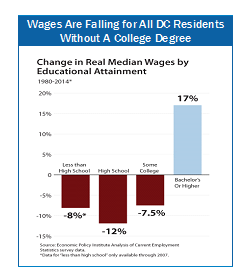The District should explore ways to reduce traffic-related injuries and fatalities without steeply raising traffic fines, as has been proposed as part of the Vision Zero initiative. The proposed increases would cause real hardship for households already struggling to make ends meet. With DC’s wide and growing income gaps, and housing costs that continue to grow further out of reach for many, the District should explore other ways to improve driver behavior.
The proposed regulations would increase many traffic fines to substantial levels. For example, fines would rise from $50 to $200 for failing to yield to a pedestrian while turning right on red, and from $65 to $300 for parking in a bike lane. Stopping this kind of behavior is, of course, important to pedestrian and bicyclist safety.
However, attempting to achieve this goal through very high traffic fines could place a substantial burden on many residents in the District. In the midst of sharply rising housing costs, incomes have been flat over the past decade for the poorest 40 percent of DC renter households. And wages have fallen for workers without a college degree. As a result, a majority of lower-income households spend at least half their income on rent and utilities.
A fine of $200 or $300 for a family with no wiggle room in their budget could mean getting behind on rent, an empty refrigerator, or a child who cannot participate in extracurricular activities. Moreover, many low-income families will see fines doubled if they are not able to pay a fine promptly due to a lack of resources. A growing body of research confirms that adding to a family’s financial instability creates stress that makes it hard for parents to make sound decisions and hard for children to succeed at school.
For these reasons, the District should put a hold on traffic fine increases to assess the impacts on low-income families and to explore alternatives.
- It may make sense to install more red light or stop-sign cameras than to increase fines. The Greater Greater Washington blog suggested that substantial fines will not have much impact if offenses are not regularly enforced.
- Penalties for the most serious traffic safety violations, such as driving more than 25 miles per hour above the speed limit, could be addressed by strengthening DC’s procedures for suspending driving privileges.
- The District should consider other approaches that incentivize better behavior without causing as much hardship. For example, the District could wipe out fines for a first or second offense if the driver maintains good behavior for a specified period, such as a year.
- The District should analyze the current impact of traffic fines by income, by comparing aggregate traffic fines with incomes by ward or zip code. And as a long-term strategy, the District should explore ways to adjust fees based on income, as some European countries do, to ensure that fees and fines match residents’ ability to pay.
The goal of reducing traffic-related injuries is important, and so is the goal of helping all DC residents thrive in the city’s challenging economy. Hopefully our leaders can find ways to meet both goals, rather than put them in conflict.
To print a copy of today’s blog, click here.
